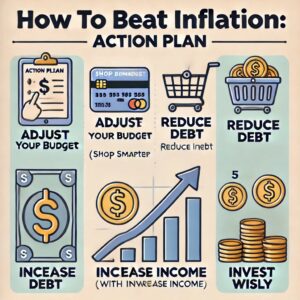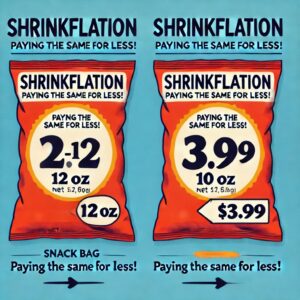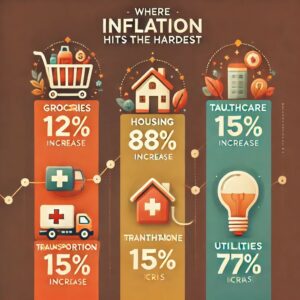The Impact Of Inflation On Expenses

Inflation—what’s that all about? At its simplest, inflation is when everything around us gradually gets more expensive over time. Do you remember when you could get a candy bar from Wal-Mart for 44 cents. Now those same size candy bars are $1.59 When I first moved into my current residence I paid $985 per month. I now pay $1400 for the exact same space no upgrades or additional square footage added. When prices rise, each unit of currency buys fewer goods and services. This is inflation in action, and it’s all about the average increase in prices.
Inflation can feel like this invisible force sneaking into our wallets, affecting not only our daily expenses but also the overall economy. Think of it as a silent tax that makes life just a bit harder. In times like these, I find comfort in scriptures. For example, the Bible offers words of wisdom, like in Matthew 6:26, assuring us that we are cared for, just as God cares for the birds of the air. It’s a gentle reminder of hope and provision amidst financial turbulence.
It’s fascinating just how much inflation shapes our world, often in surprising ways. Did you know that in the 1970s, the U.S. experienced inflation rates reaching nearly 15%? That period, known as ‘The Great Inflation,’ left a lasting impact on economic policies we see today. Even basics like milk and bread became harder to come by. Here at home, you might have noticed groceries or fuel prices getting steeper. These are all signs of inflation’s ripple effects across different sectors. Understanding inflation helps us navigate these challenges better. Recognizing the signs early can be vital to making sure you can weather the storm.

Inflation and Its Impact on Everyday Expenses
Inflation affects everyday expenses in several ways, often making it more challenging to maintain the same standard of living. Here are some key impacts:
Reduced Purchasing Power – The same amount of money buys less, which can shrink disposable income and affect savings.
Higher Healthcare Costs – Medical services, prescriptions, and insurance premiums tend to rise with inflation, making healthcare more costly.
Shrinkflation – Some products shrink in size while maintaining the same price, effectively increasing the cost per unit without changing the sticker price.
Wage vs. Expense Gap – Wages may not always keep up with inflation, meaning people have to stretch their income further to afford the same lifestyle.
Effect on Retirement – Fixed-income retirees find it harder to sustain their lifestyle as their savings may not keep pace with rising costs.
The one that bothers me the most is shrinkflation. Charging the same price for less product doesn’t seem ethical. I understand that it isn’t illegal but I wish that greed wasn’t the main motive that affected the business practices of major companies. I do understand that being profitable is important for the success of a company but I believe that there is a way to achieve a profitable bottom line while practicing transparency and fair pricing for the consumer. We as consumers have a responsibility to be aware and make choices that benefit our budgets. If the products and services offered no longer meet our needs we must search for alternatives that don’t hurt our pockets.

While inflation isn’t something we can always control, having strategies to manage these expenses can offer relief. Planning meals around sales, carpooling, or using public transport can make a difference, giving our finances a bit of breathing room.
Scriptures offer solace during these times, providing comfort to our anxious thoughts. Philippians 4:19 reminds us, ‘And my God will supply every need of yours according to his riches in glory.’ It’s reassuring us that we’re not alone in this journey.
Recent data drives home the impact of inflation. In the past year, the Consumer Price Index has shown significant jumps in cost, highlighting areas like housing and groceries where we’re feeling it the most. This kind of data helps pinpoint where to tighten or adjust our spending habits.
Though it’s tough, understanding inflation makes us smarter shoppers and savvier savers. Adjusting our spending and preparing where possible can soften the blow and keep our finances healthier.
Long-Term Consequences: Preparing for the Inflationary Future
Inflation can have big implications down the line. Over time, it can seriously mess with our finances, eating up savings and reducing the value of cash tucked away for a rainy day.
So what do we do about it? A forward-thinking strategy involves diversified investments. Stocks, real estate, and even precious metals can offer a buffer against inflation’s gnawing effects. I recently read an article that talked about how the price of gold per ounce is right at 2.9k. There are multiple ways to invest so while it may not be the stock market, gold is a great place to begin.
In Proverbs 21:5, ‘The plans of the diligent lead surely to abundance.’
Being proactive means planning now to enjoy security later, even when inflation tries to throw its weight around.
But there’s more—saving is great, but it needs to be strategic. Consider inflation-protected securities or bonds that adjust based on inflation rates. They might not get you rich overnight, but they do keep value intact amidst rising costs. Watching economic trends or political shifts, for instance, provides insights into what’s ahead.

Smart planning and a bit of faith can help stretch our resources further. We can’t control every hiccup in the economy, but with the right tools and mindset, facing the inflationary future doesn’t have to be a nail-biting experience.
Amid these facts and figures, we can look to the word of God for wisdom and direction. Psalms 46:1 says that, ‘God is our refuge and strength, a very present help in trouble,’ provides a beacon of hope, nudging us to seek peace and reassurance, especially when financial uncertainty looms large. So do not lose heart our God is a good God!
Disclaimer:
The information provided in this post is based on my experience and research in personal finance. While I strive to share accurate and helpful insights, this content is for informational purposes only and should not be considered professional financial advice. Please consult a qualified financial advisor for advice tailored to your specific situation.






